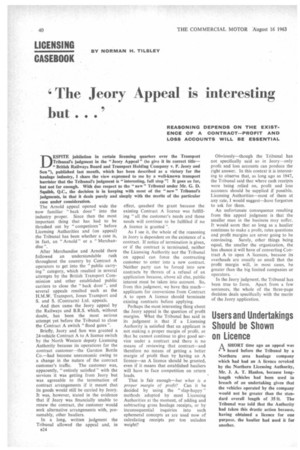The Jeory Appeal is interesting but . . . '
Page 42

If you've noticed an error in this article please click here to report it so we can fix it.
BY NORMAN H. TILSLEY
DESPITE jubilation in certain licensing quarters over the Transport Tribunal's judgment in the "Jeory Appeal" (to give it its correct tills— "British Railways Board and Transport Holding Company v. P. Jeory and Son "), published last month, which has been described as a victory for the haulage industry, I share the view expressed to me by a well-known transport barrister that the Tribunal's judgment is "interesting, full stop "! It goes so far, but not far enough. With due respect to the " new " Tribunal under Mr. G. D. Squibb, Q.C., the decision is in keeping with most of the " new " Tribunal's judgments, in that it deals purely and simply with the merits of the particular case under consideration.
The Arnold appeal opened wide the now familiar "back door" into the industry proper. Since then the most important thing that has had to be thrashed out by "competitors" before Licensing Authorities and (on appeal) the Tribunal has been whether a case is, in fact, an " Arnold " or a "Merchandise ".
After Merchandise and Arnold there followed an understandable rush throughout the country by Contract A operators to get into the "public carrying" category, which resulted in several attempts by the British Transport Commission and other established public carriers to close the "back door ", and several appeals resulted such as the H.M.W. Transport, Jones Transport and S. and S. (Contracts) Ltd. appeals.
And then came the Jeory appeal by the Railways and B.R.S. which, without doubt, has been the most serious attempt yet before the Tribunal to close the Contract A switch "flood gates ".
Briefly, Jeory and Son was granted a 24-vehicle Contract A to A licence switch by the North Western deputy Licensing Authority because its operations for the contract customer—the Qarston Bottle Co.—had become uneconomic owing to a change in the nature of the contract
customer's traffic. The customer was, apparently, "entirely satisfied" with the services it was getting from Jeory but was agreeable to the termination of contract arrangements if it meant that its goods would still be carried by Jeory. It was, however, stated in the evidence that if Jeory was financially unable to renew the contract, the customer would seek alternative arrangements with, presumably, other hauliers.
In a long, written judgment the Tribunal allowed the appeal and, in B24 effect, quashed the grant because the existing Contract A licence was fulfilling "all the customer's needs and those needs will continue to he fulfilled if no A licence is granted ".
As I see it, the whole of the reasoning in Jeory is dependent on the existence of a contract. If notice of termination is given, or if the contract is terminated, neither the Licensing Authority nor the Tribunal on appeal can force the contracting customer to enter into a new contract. Neither party can be forced into new contracts by threats of a refusal of an application because, above all else, public interest must be taken into account. So, from this judgment, we have this much— applicants for conversions from Contract A to open A licence should terminate existing contracts before applying.
Perhaps the most interesting thing about the Jeory appeal is the question of profit margins. What the Tribunal has said in its judgment is that if a Licensing Authority is satisfied that an applicant is not making a proper margin of profit, or that he cannot continue to give good service under a contract and there is no means of reviewing that contract—and therefore no means of getting a better margin of profit than by having an A licence—an A licence should be granted, even if it means that established hauliers will have to face competition on return loads.
That is fair enough—hut what is a proper margin of profit? Can it he decided by using the " slap-happy " methods adopted by most Licensing Authorities at the moment, of adding and subtracting gross haulage receipts, or by inconsequential inquiries into such ephemeral concepts as are used now of calculating receipts per ton unladen weight?
Obviously—though the Tribunal has not specifically said so in Jeory—only profit and loss accounts can produce the right answer. In this context it is interesting to observe that, as long ago as 1947, the Tribunal said that where cash receipts were being relied on, profit and loss accounts should be supplied if possible. Licensing Authorities—most of them at any rate. I would suggest—have forgotten to ask for them.
An unfortunate consequence resulting from this appeal judgment is that the smaller man in the business may suffer. It would seem that so long as a haulier continues to make a profit, rates questions and profit margins are never going to he convincing. Surely, other things being equal, the smaller the organization, the less chance it will have of converting Contract A to open A licences, because its overheads are usually so small that the profit margin will, in most cases, be greater than the big limited companies or operators.
In the Jeory judgment, the Tribunal has been true to form. Apart from a few sentences, the whole of the three-page decision deals specifically with the merits of the Jeory application.












































































































